Charles E W Bean, Diaries, AWM38 3DRL 606/275/1 - 1918 - 1938 - Part 8
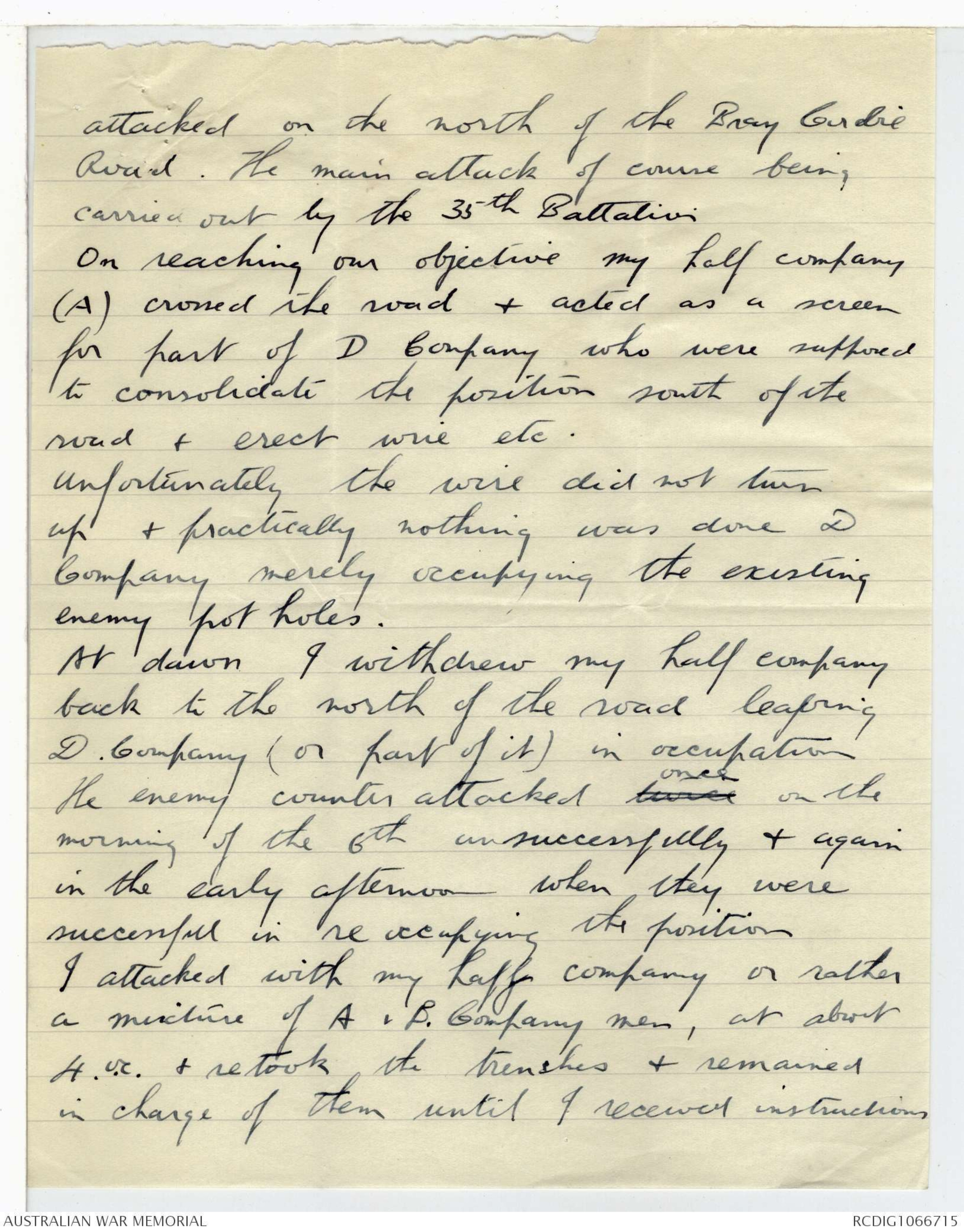
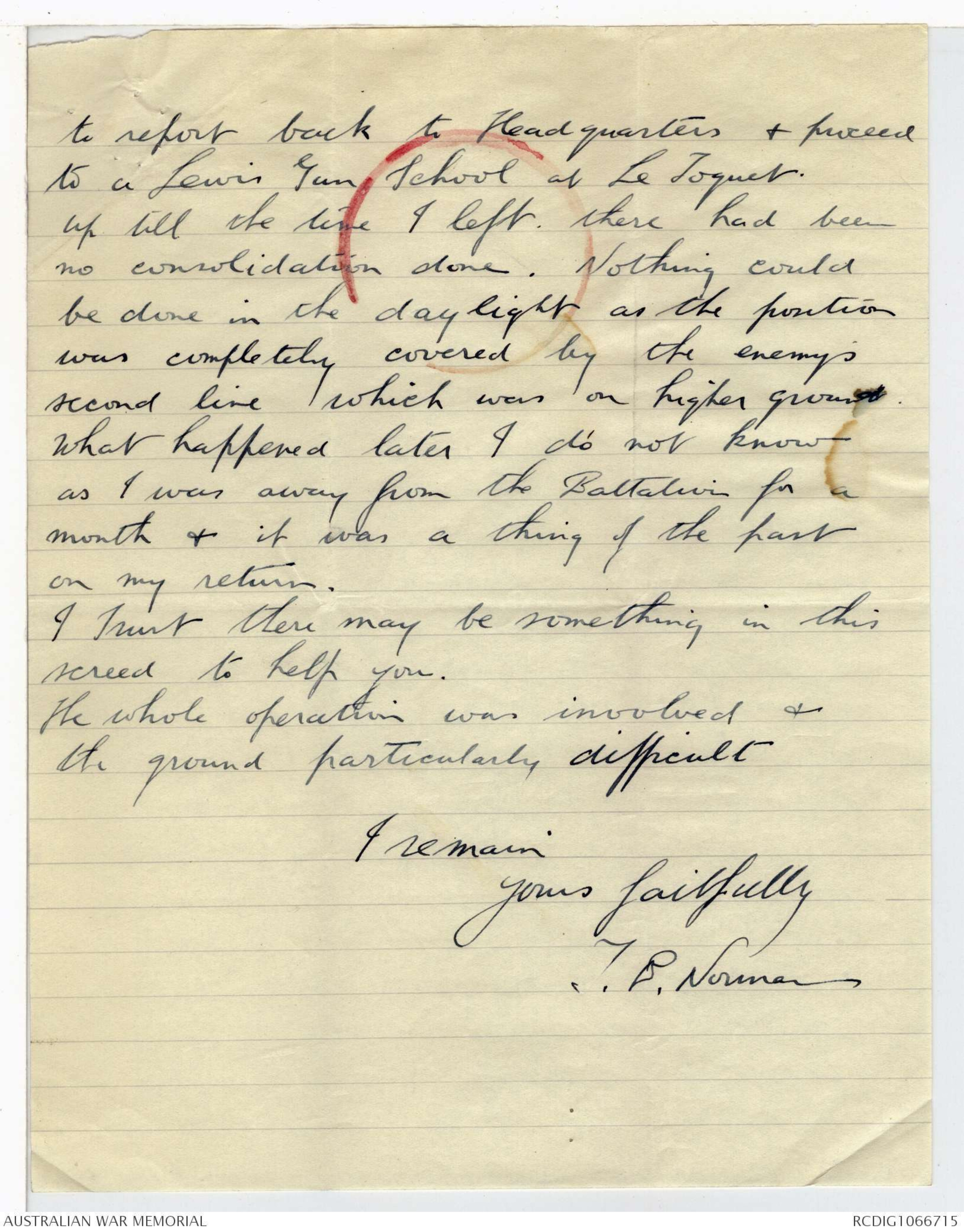
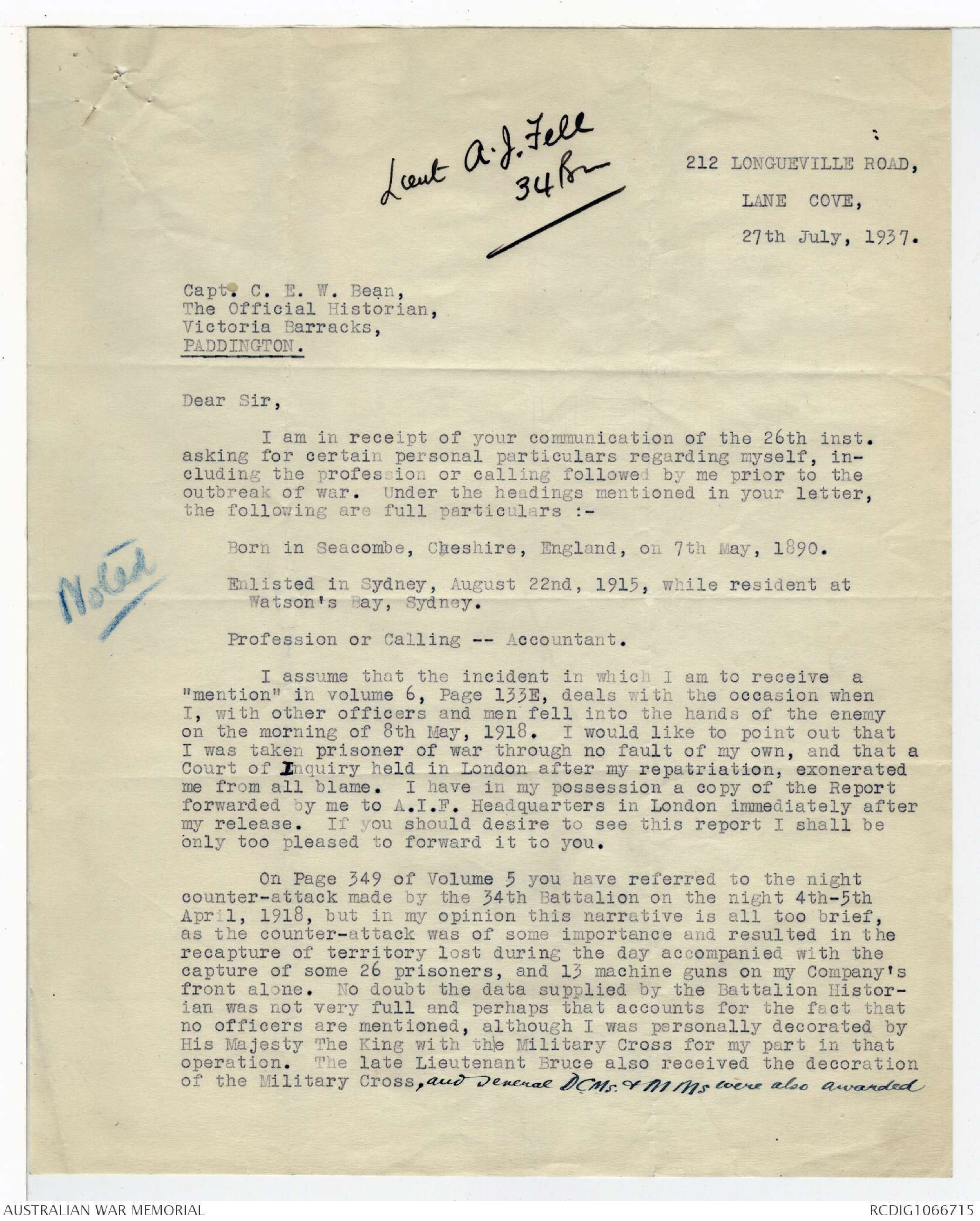
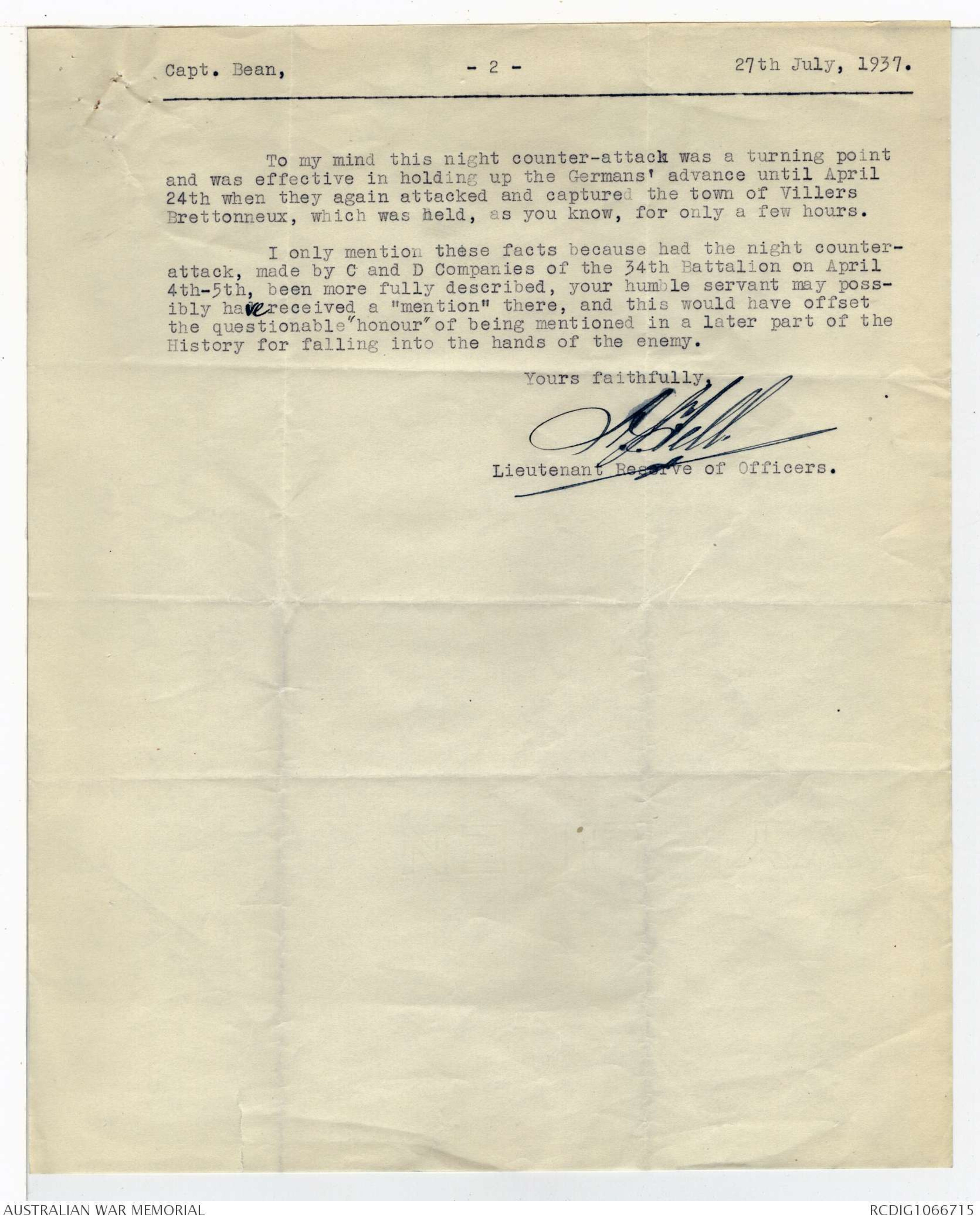
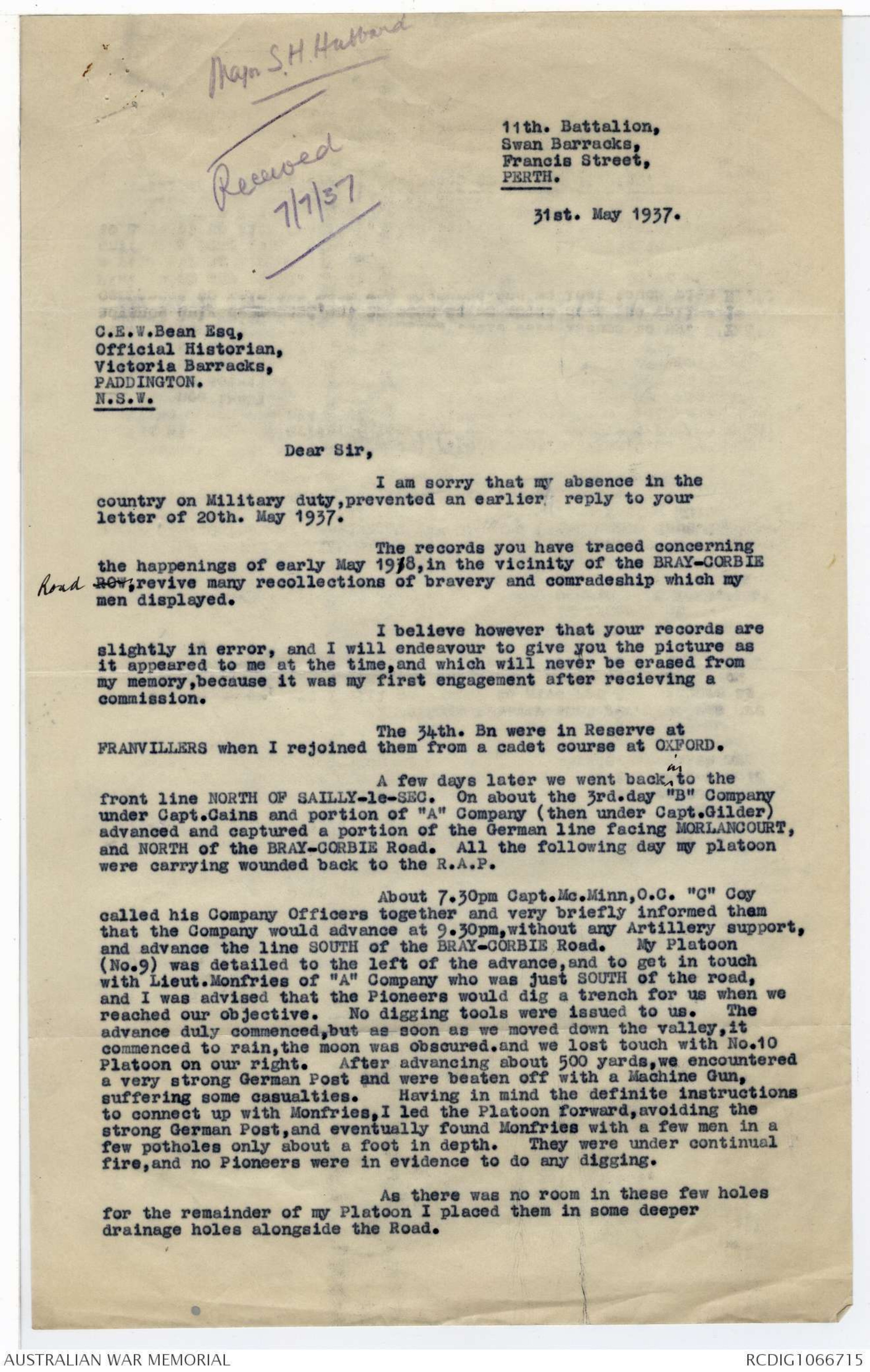
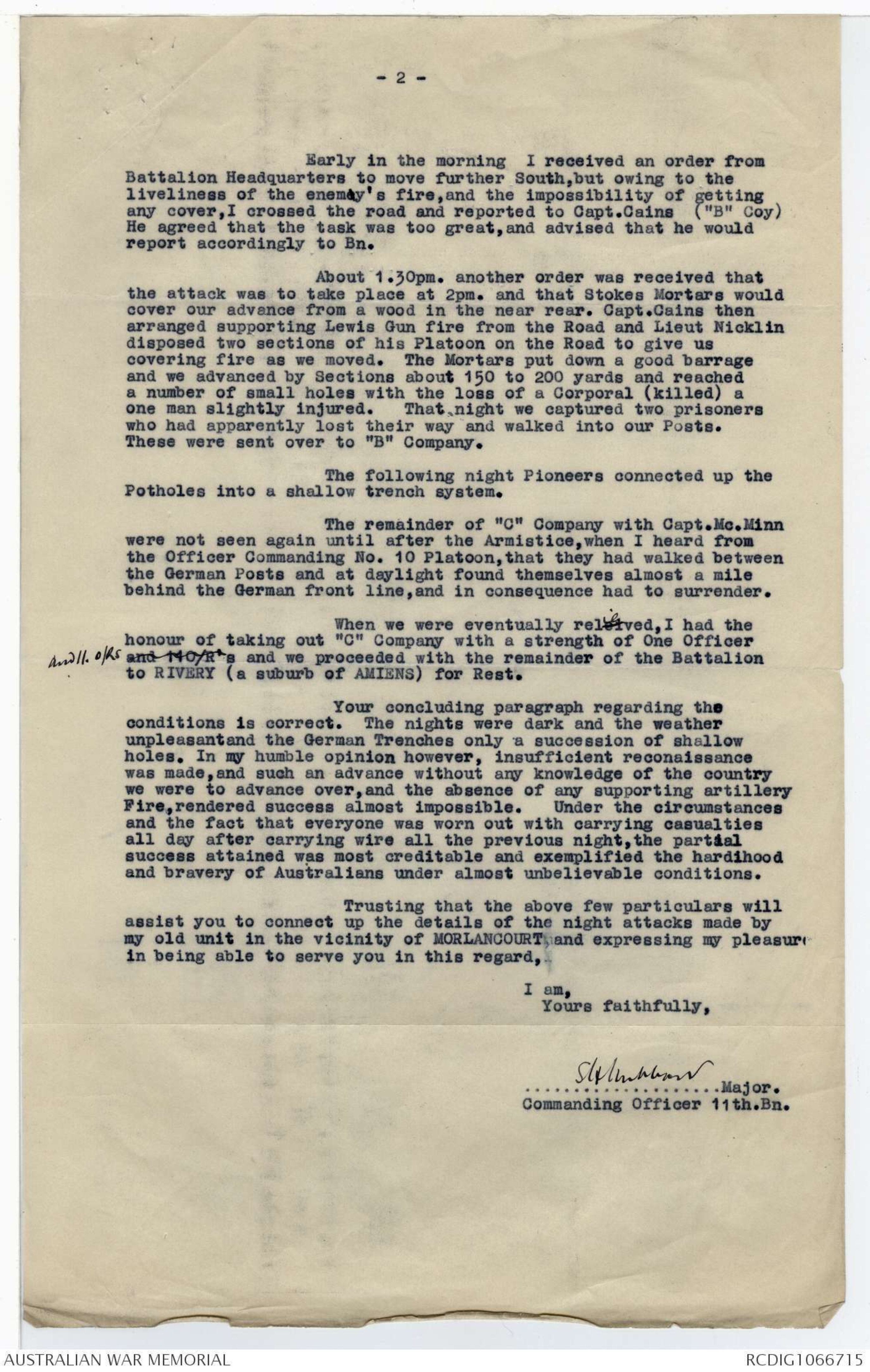
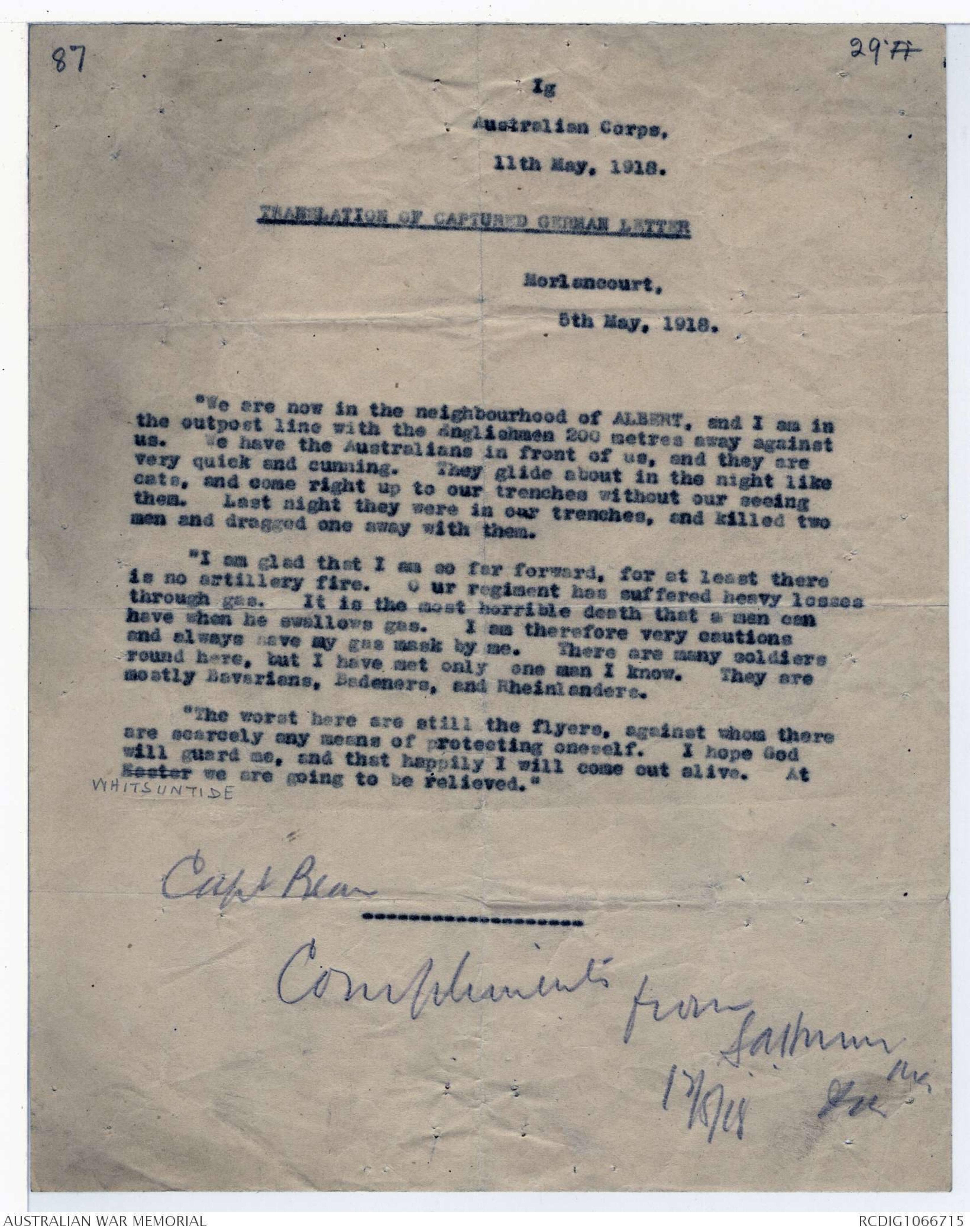
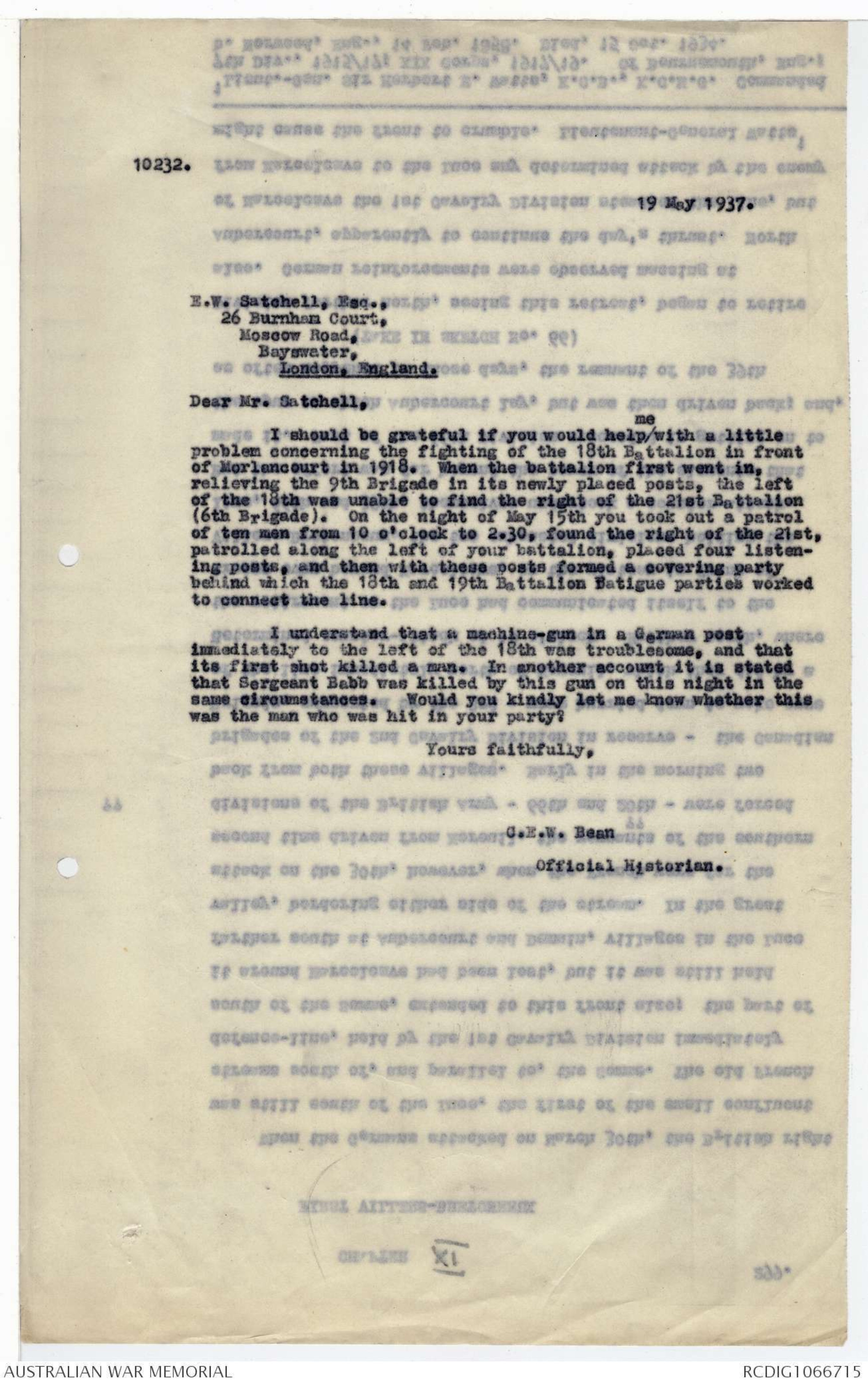
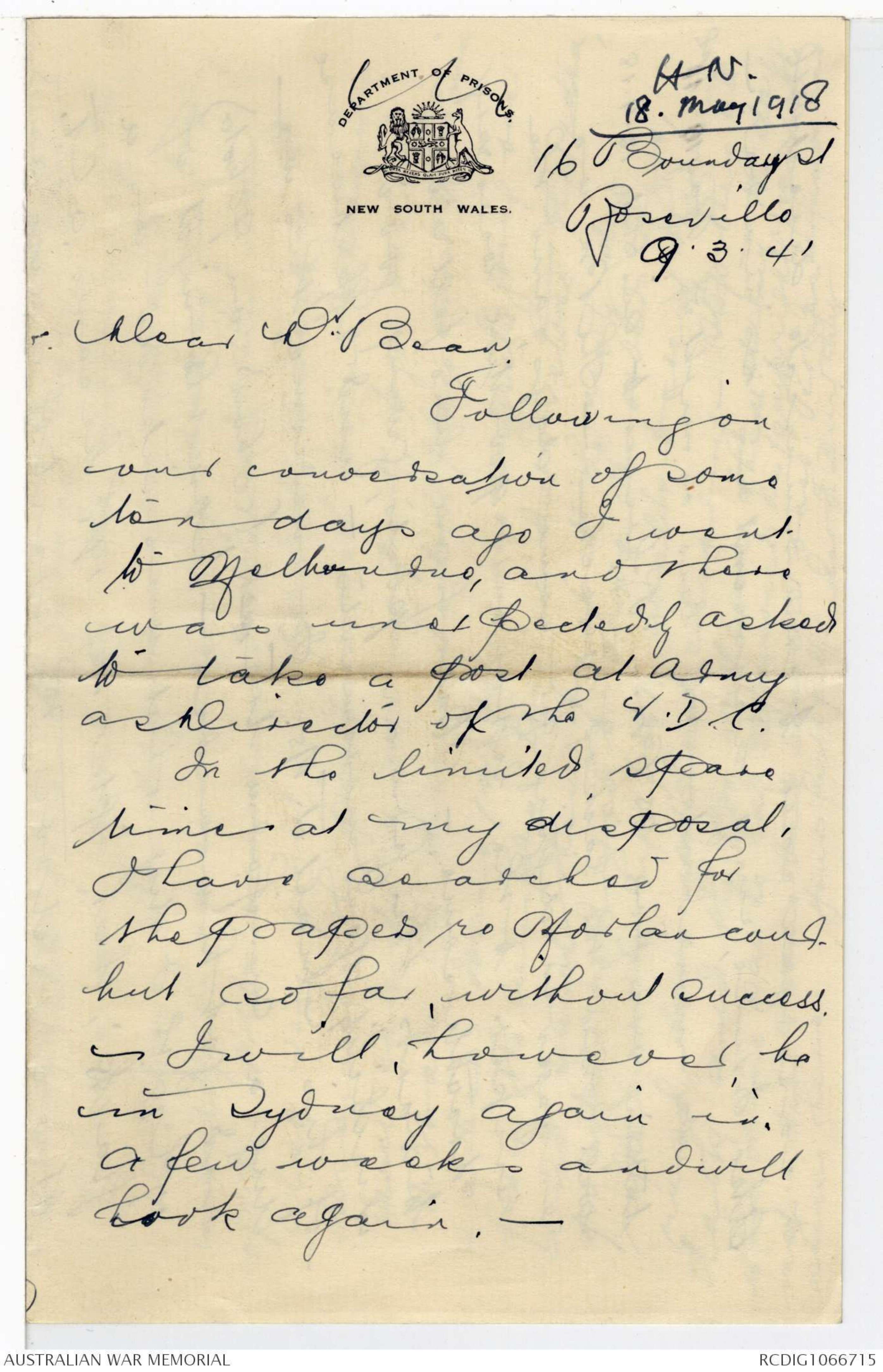
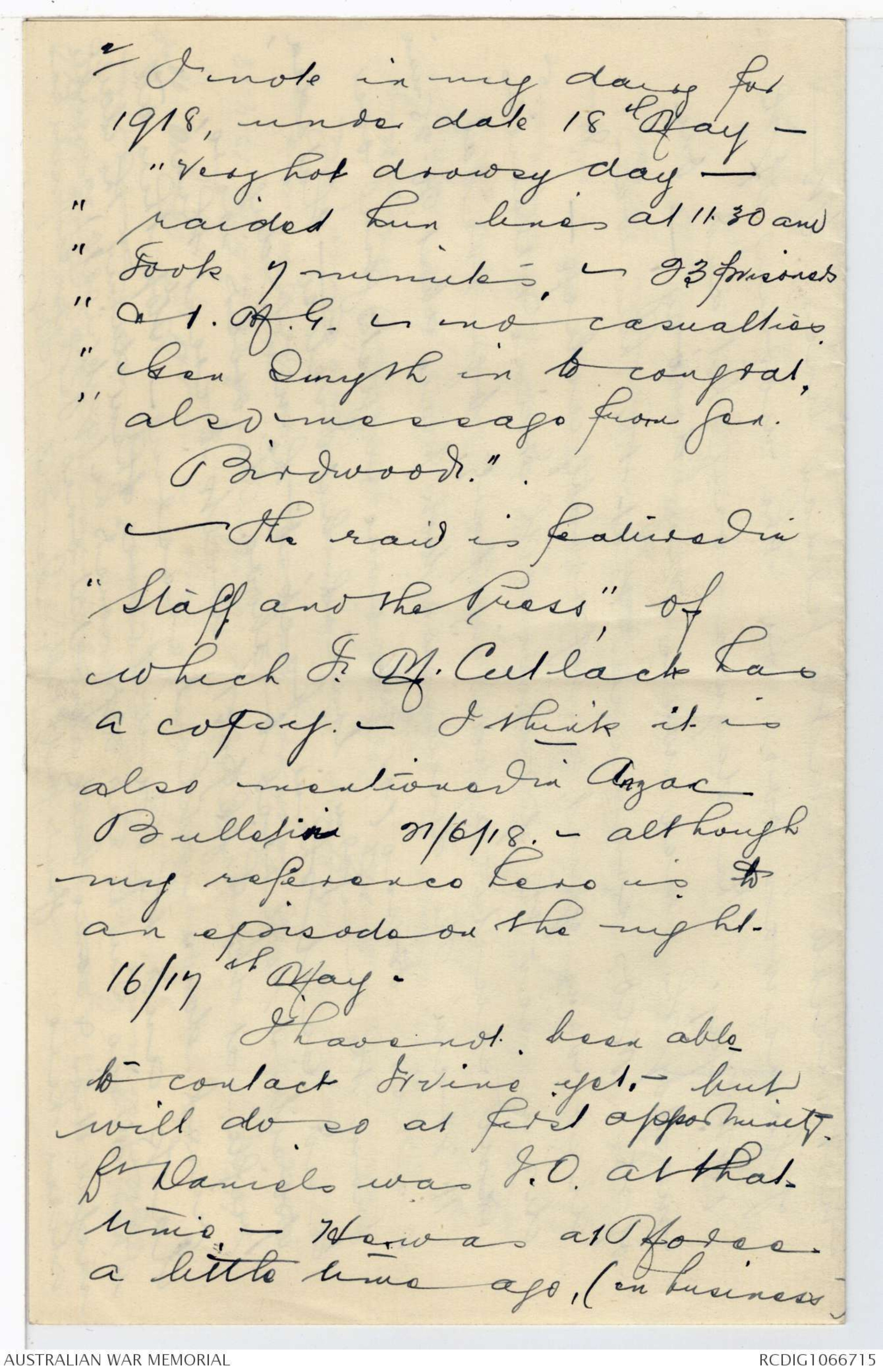
attacked on the north of the Bray Corbie
Road. The main attack of course being
carried out by the 35th Battalion.
On reaching our objective my half company
(A) crossed the road & acted as a screen
for part of D Company who were supposed
to consolidate the position south of the
road & erect wire etc.
Unfortunately the wire did not turn
up & practically nothing was done D
Company merely occupying the existing
enemy pot holes.
At dawn I withdrew my half company
back to the north of the road leaving
D Company (or part of it) in occupation
the enemy counter attacked twice once on the
morning of the 6th unsuccessfully & again
in the early afternoon when they were
successful in reoccupying the position
I attacked with my half company or rather
a mixture of A & B Company men, at about
4. o.c. & retook the trenches & remained
in charge of them until I received instructions
to report back to Headquarters & proceed
to a Lewis Gun School at Le Toquet.
up till the time I left there had been
no consolidation done. Nothing could
be done in the daylight as the position
was completely covered by the enemys
second line which was on higher ground.
What happened later I do not know
as I was away from the Battalion for a
month & it was a thing of the past
on my return.
I trust there may be something in this
screed to help you.
The whole operation was involved &
the ground particularly difficult
I remain
Yours faithfully
J. B. Norman
[*Lieut A.J. Fell
34Bn*]
212 LONGUEVILLE ROAD,
LANE COVE,
27th July, 1937.
Capt. C. E. W. Bean,
The Official Historian,
Victoria Barracks,
PADDINGTON.
Dear Sir,
I am in receipt of your communication of the 26th inst.
asking for certain personal particulars regarding myself, including
the profession or calling followed by me prior to the
outbreak of war. Under the headings mentioned in your letter,
the following are full particulars :-
[*Noted*] Born in Seacombe, Cheshire, England, on 7th May, 1890.
Enlisted in Sydney, August 22nd, 1915, while resident at
Watson's Bay, Sydney.
Profession or Calling -- Accountant.
I assume that the incident in which I am to receive a
"mention" in volume 6, Page 133E, deals with the occasion when
I, with other officers and men fell into the hands of the enemy
on the morning of 8th May, 1918. I would like to point out that
I was taken prisoner of war through no fault of my own, and that a
Court of Inquiry held in London after my repatriation, exonerated
me from all blame. I have in my possession a copy of the Report
forwarded by me to A.I.F. Headquarters in London immediately after
my release. If you should desire to see this report I shall be
only too pleased to forward it to you.
On page 349 of Volume 5 you have referred to the night
counter-attack made by the 34th Battalion on the night 4th-5th
April, 1918, but in my opinion this narrative is all too brief,
as the counter-attack was of some importance and resulted in the
recapture of territory lost during the day accompanied with the
capture of some 26 prisoners, and 13 machine guns on my Company's
front alone. No doubt the data supplied by the Battalion Historian
was not very full and perhaps that accounts for the fact that
no officers are mentioned, although I was personally decorated by
His Majesty The King with the Military Cross for my part in that
operation. The late Lieutenant Bruce also received the decoration
of the Military Cross, and several D.CMs. & MMs were also awarded
Capt. Bean, -2- 27th July, 1937.
To my mind this night counter-attack was a turning point
and was effective in holding up the Germans' advance until April
24th when they again attacked and captured the town of Villers
Brettonneux, which was held, as you know, for only a few hours.
I only mention these facts because had the night counter-attack,
made by C and D Companies of the 34th Battalion on April
4th-5th, been more fully described, your humble servant may possibly
have received a "mention" there, and this would have offset
the questionable "honour" of being mentioned in a later part of the
History for falling int the hands of the enemy.
Yours faithfully,
A.J.Fell
Lieutenant Reserve of Officers.
[*Major S.H. Hubbard
Received
7/7/37*]
11th. Battalion,
Swan Barracks,
Francis Street,
PERTH.
31st May 1937.
C.E.W.Bean Esq,
Official Historian,
Victoria Barracks,
PADDINGTON.
N.S.W.
Dear Sir,
I am sorry that my absence in the
country on Military duty ,prevented an earlier reply to your
letter of 20th. May 1937.
The records you have traced concerning
the happenings of early May 1918, in the vicinity of the BRAY-CORBIEROW Road, revive many recollections of bravery and comradeship which my
men displayed.
I believe however that your records are
slightly in error, and I will endeavour to give you the picture as
it appeared to me at the time,and which will never be erased from
my memory, because it was my first engagement after receiving a
commission.
The 34th. Bn were in Reserve at
FRANVILLERS when I rejoined them from a cadet course at OXFORD.
A few days later we went back ^in to the
front line NORTH OF SAILLY-le-SEC. On about the 3rd.day "B" Company
under Capt.Cains and portion of "A" Company (then under Capt.Gilder)
advanced and captured a portion of the German line facing MORLANCOURT,
and NORTH of the BRAY-CORBIE Road. All the following day my platoon
were carrying wounded back to the R.A.P.
About 7.30pm Capt.McMinn,O(.C. "C" Coy
called his Company Officers together and very briefly informed them
that the Company would advance at 9.30pm, without any Artillery support,
and advance the line SOUTH of the BRAY-CORBIE Road. My Platoon
(No.9) was detailed to the left of the advance, and to get in touch
with Lieut.Monfries of "A" Company who was just SOUTH of the road,
and I was advised that the Pioneers would dig a trench for us when we
reached our objective. No digging tools were issued to us. The
advance duly commenced,but as soon as we moved down the valley,it
commenced to rain,the moon was obscured.and we lost touch with No.10
Platoon on our right. After advancing about 500 yards,we encountered
a very strong German Post and were beaten off with a Machine Gun,
suffering some casualties. Having in mind the definite instructions
to connect up with Monfries,I led the Platoon forward,avoiding the
strong German Post,and eventually found Monfries with a few men in a
few potholes only about a foot in depth. They were under continual
fire,and no Pioneers were in evidence to do any digging.
As there was no room in these few holes
for the remainder of my Platoon I placed them in some deeper
drainage holes alongside the Road.
- 2 -
Early in the morning I received an order from
Battalion Headquarters to move further South,but owing to the
liveliness of the enemey's fire,and the impossibility of getting
any cover,I crossed the road and reported to Capt.Cains ("B" Coy)
He agreed that the task was too great,and advised that he would
report accordingly to Bn.
About 1.30pm. another order was received that
the attack was to take place at 2pm. and that Stokes Mortars would
cover our advance from a wood in the near rear. Capt.Cains then
arranged supporting Lewis Gun fire from the Road and Lieut Nicklin
disposed two sections of his Platoon on the Road to give us
covering fire as we moved. The Mortars put down a good barrage
and we advanced by Sections about 150 to 200 yards and reached
a number of small holes with the loss of a Corporal (killed) a
one man slightly injured. That night we captured two prisoners
who had apparently lost their way and walked into our Posts.
These were sent over to "B" Company.
The following night Pioneers connected up the
Potholes into a shallow trench system.
The remainder of "C" Company with Capt.Mc.Minn
were not seen again until after the Armistice,when I heard from
the Officer Commanding No. 10 Platoon,that they had walked between
the German Posts and at daylight found themselves almost a mile
behind the German front line,and in consequence had to surrender.
When we were eventually relieved,I had the
honour of taking out "C" Company with a strength of One Officerand 14O/R's and 11. O/Rs and we proceeded with the remainder of the Battalion
to RIVERY (a suburb of AMIENS) for Rest.
Your concluding paragraph regarding the
conditions is correct. The nights were dark and the weather
unplesantand the German Trenches only a succession of shallow
holes. In my humble opinion however, insufficient reconaissance
was made,and such an advance without any knowledge of the country
we were to advance over,and the absence of any supporting artillery
Fire,rendered success almost impossible. Under the circumstances
and the fact that everyone was worn out with carrying casualties
all day after carrying wire all the previous night,the partial
success attained was most creditable and exemplified the hardihood
and bravery of Australians under almost unbelievable conditions.
Trusting that the above few particulars will
assist you to connect up the details of the night attacks made by
my old unit in the vicinity of MORLANCOURT and expressing my pleasure
in being able to serve you in this regard,
I am,
Yours faithfully,
S H Hubbard Major.
Commanding Officer 11th.Bn.
87
29'A'
Ig
Australian Corps,
11th May, 1918.
TRANSLATION OF CAPTURED GERMAN LETTER
Morlancourt,
5th May, 1918.
"We are now in the neighbourhood of ALBERT, and I am in
the outpost line with the Englishmen 200 metres away against
us. We have the Australian in front of us, and they are
very quick and cunning. They glide about in the night like
cats, and come right up to our trenches without our seeing
them. Last night they were in our trenches, and killed two
men and dragged one away with them.
"I am glad that I am so far forward, for at least there
is no artillery fire. O ur regiment has suffered heavy losses
through gas. It is the most horrible death that a man can
have when he swallows gas. I am therefore very cautions
and always have my gas mask by me. There are many soldiers
round here, but I have met only one man I know. They are
mostly Bavarians, Badeners, and Rheinlanders.
"The worst here are still the flyers, against whom there
are scarcely any means of protecting oneself. I hope God
will guard me, and that happily I will come out alive. AtKester WHITSUNTIDE we are going to be relieved."
Capt Bean
Compliments
from
[[?]]
MG
[[?]]
17/8/18
10232.
19 May 1937.
E.W. Satchell, Esq.,
26 Burnham Court,
Moscow Road,
Bayswater,
London, England.
Dear Mr. Satchell,
I should be grateful if you would help/me with a little
problem concerning the fighting of the 18th Battalion in front
of Morlancourt in 1918. When the battalion first went in,
relieving the 9th Brigade in its newly placed posts, the left
of the 18th was unable to find the right of the 21st Battalion
(6th Brigade). On the night of May 15th you took out a patrol
of ten men from 10 o'clock to 2.30, found the right of the 21st,
patrolled along the left of your battalion, placed four listening
posts, and then with these posts formed a covering party
behind which the 18th and 19th Battalion Fatigue parties worked
to connect the line.
I understand that a machine-gun in a German post
immediately to the left of the 18th was troublesome, and that
its first shot killed a man. In another account it is stated
that Sergeant Babb was killed by this gun on this night in the
same circumstances. Would you kindly let me know whether this
was the man who was hit in your party?
Yours faithfully,
C.E.W. Bean
Official Historian.
DEPARTMENT OF PRISONS.
NEW SOUTH WALES.
HN.
18. May 1918
16 Boundary St
Roseville
9.3.41
Dear Dr Bean.
Following on
our conversation of some
ten days ago I went
to Melbourne, and there
was unexpectedly asked
to take a post at Army
as Director of the G.D.C.
In the limited spare
time at my disposal,
I have searched for
the papers re Morlancourt
but so far, without success.
- I will, however, be
in Sydney again in
a few weeks and will
look again. -
2
I note in my diary for
1918, under date 18th May -
"Very hot drowsy day -
"raided hun lines at 11.30 am
"Took 7 minutes, - 23 prisoners
"& 1. M.G. - no casualties.
"Gen Smyth in to congral,
"also message from Gen.
Birdwood." .
- The raid is reatured in
"Staff and the Press", of
which J. M. Cutlack has
a copy - I think it is
also mentioned in Anzac
Bulletin 21/6/18. - although
my reference here is to
an episode on the night
16/17th May.
I have not been able
to contact Irvine yet. - but
will do so at first opportunity.
Lt Daniels was J.O. at that
time - He was at [[?]]force
a little time ago, (on business)
 Sam scott
Sam scottThis transcription item is now locked to you for editing. To release the lock either Save your changes or Cancel.
This lock will be automatically released after 60 minutes of inactivity.